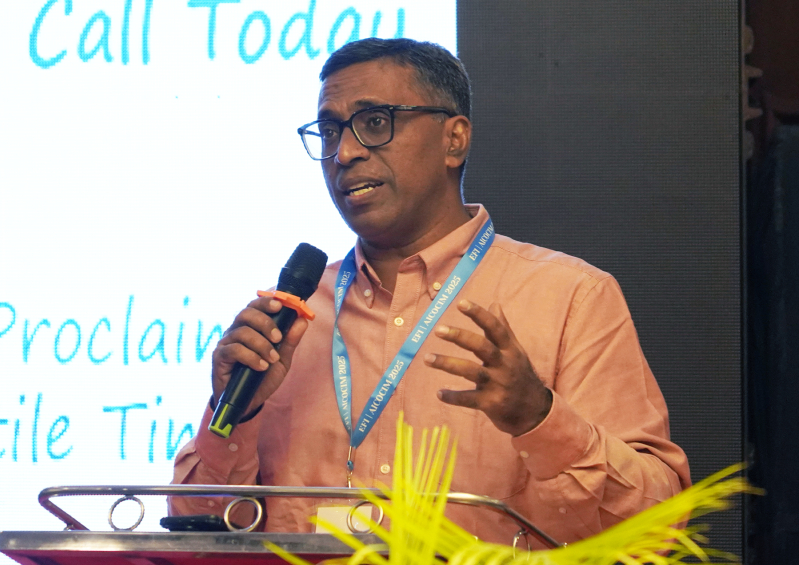
On the opening day of the All India Congress on Church in Mission (AICOCIM), Rev. Dr. Paul Mathews, National Overseer of Filadelfia Fellowship Churches of India and Senior Pastor of Rajasthan Pentecostal Church, delivered a plenary address urging the Church in India to renew its witness through authenticity, purity, unity, and boldness.
Speaking from Romans 1:16, where the Apostle Paul declares, “I am not ashamed of the gospel, for it is the power of God for salvation to everyone who believes,” Mathews centered his message on the call for Christians to remain unashamed of the gospel and committed to proclaiming Christ with courage in challenging times.
Mathews began by pointing to the example of the apostles, who lived and died with unflinching commitment to Christ. Though historical details vary, traditions portray them as men who bore witness to the gospel even at great personal cost.
“We are here holding great titles, great ministries, great responsibilities, great budgets,” he told delegates. “But I want to say it aloud with you this afternoon: we are not ashamed of the person of the Lord Jesus Christ. We are not ashamed of the message of our Lord Jesus Christ. We are not ashamed of the cross of our Lord Jesus Christ. We are not ashamed of the gospel of our Lord Jesus Christ.”
This conviction, he said, should not remain rhetorical but must shape how Indian Christians live, lead, and serve today.
Proclaiming Christ with authenticity
The first quality Mathews emphasized was authenticity. For him, authenticity requires consistency between words and actions, ensuring that both align with the gospel message.
“My words have to match my message. My actions have to match my message,” he said. “Plastic Christianity is over. People have looked into our lives, people have looked into our messages, and sadly in many cases we have been found wanting.”
He stressed that while methods of communication may adapt with new technologies or generational shifts, the core of the gospel cannot change. “Yes, we can be creative,” Mathews said. “But creativity does not give us the license to alter the core message of our gospel that has been handed down to us.”
He cited the pattern of Ezra, who devoted himself to studying, practicing, and then teaching Scripture. That order, Mathews argued, should remain the guiding principle of ministry today: “We study, we do, and then we teach what we have studied and done. It will create a generation of passionate believers.”
Proclaiming Christ with purity
Mathews’ second emphasis was purity, particularly in personal conduct and financial integrity. He warned that Christian ministry can easily slip into a professionalized system where comfort overshadows holiness.
“Ministry has become a business for many, and I say this very painfully,” he said. “Somehow we have become careless about the level of purity we are exhibiting.”
He urged leaders to hold themselves to higher standards than those set by society. In every area — family, finances, sexuality, or public witness — believers must pursue holiness that reflects Christ.
“Our conduct and our character have to be higher than the examples or expectations of the people around us,” he said. “We are called to be much more holy than we are today.”
Proclaiming Christ with unity
The third theme of the address was unity. Mathews spoke passionately about the need for churches across traditions to work together rather than against one another.
“I need you to preach the gospel. I need you to defend my back. I need you to help me. I need you to keep me accountable. I need you to keep me humble,” he said.
He reminded participants that Christ cannot be divided and that denominational or cultural differences must not fracture the witness of the Church. Unity, he emphasized, is not about uniformity but about belonging to one Lord and one mission.
“The proof of our gospel is that we love one another,” Mathews said. “The proof is not our big buildings, our music programs, or our YouTube channels. It is that we respect one another, greet one another, and honor one another.”
Drawing from John 17, he highlighted Jesus’ prayer that his followers may be one so that the world may believe. For Mathews, unity is not an optional virtue but a vital demonstration of the gospel’s truth.
Proclaiming Christ with boldness
Mathews concluded with a call to boldness. While acknowledging his own temperament as naturally cautious, he said bold proclamation of Christ is essential in a time of rapid cultural change.
“There is no other alternative,” he said. “You have to stand up, and the only means of preaching the gospel in changing scenarios like today is that you stand up and preach the gospel with boldness.”
Pointing to Jesus’ words in John 16:33, “Take heart, I have overcome the world,” Mathews said the ultimate source of courage comes not from institutions or resources but from Christ himself.
Endurance and reliance on the Spirit
In his closing exhortations, Mathews encouraged delegates to affirm three commitments: to share the gospel with conviction, compassion, and love even in the face of difficulty; to maintain humility, gentleness, and love while responding without anger or fear; and to trust the Holy Spirit to provide strength, wisdom, and words in moments of need.
“It is easier caught than taught,” he reminded the audience. “People need to see you bold while preaching. People need to see you authentic while sharing. People need to see you pure in how you handle money. We are called to live that kind of lifestyle.”
For Mathews, AICOCIM itself serves as a catalyst for this kind of renewal. Using the metaphor of a helper who wipes a windshield so a driver can see clearly at night, he described his role as helping fellow leaders regain clarity for the journey ahead.
“This Congress is helping you to think and focus so that you can go back not just energized but with greater vision and greater cooperation in the days to come,” he said.
Mathews returned repeatedly to the central conviction of his address: that the Church in India must hold fast to the essentials of Christian faith and witness.
“We hold Jesus higher than our institutions. We hold the cross higher than our experiences. We hold Jesus higher than our own thinking capacities,” he said. “We are not ashamed of the gospel. At the same time, we are called to preach it, to share it, to live it with authenticity, purity, unity, and boldness.”






